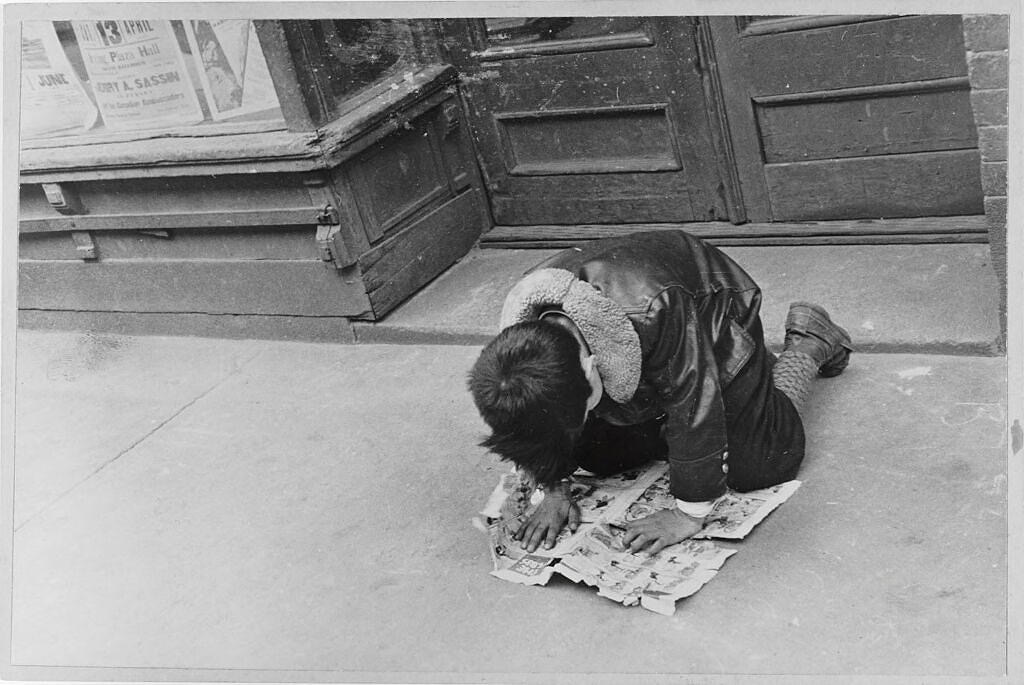AGreatDepression

Ben Shahn: Untitled [Greenwich Village, New York City] (1935)
" … the reason I had a chance to be alive."
My father's brother Dan was born three and a half months after his parents were married in 1921. They were married far away enough from Mt. Angel to ensure that none of the locals would witness the scandal, his mom having recently been the local pharmacist's wife. They lived that first year or more in St. Helens, a town sufficiently distant that nobody who knew anything would likely bump into them. They returned with, as I mentioned earlier, a remarkably mature infant. My father, Robert Clancy Schmaltz, arrived shortly after that. The couple settled into a tiny house—"a cottage small near a waterfall"—in nearby Scotts Mills, a few miles out of Mt. Angel, but distant enough to avoid daily scandal. My grandfather Nick assumed responsibility for Schmaltz & Sons’ deliveries on that side of the county. The kids, Dan and Bob, settled into school and small-town life. Their parents divorced sometime after 1930. Their mom, Carrie, had been carrying on with Ed, a mechanic whose shop was just down the alley from their place. This separation injected fresh chaos into everyone's lives.
My dad and Dan began spending more time with their grandparents, even attending the Catholic school near their place. The Schmaltzes tried hard to protect the grandkids from their mother, refusing her entrance to visit until she and Ed, her third husband, tried visiting the kids at school. Grandpa and Grandma had convinced my dad that his mother was evil, that if she ever got her hands on him, he'd never see his "real" family again. He had doting uncles, aunts, and stern grandparents, so he believed what they told him. When he realized his mother was entering the school, he climbed out a window and ran across the square to his grandparent’s house, where his grandmother dutifully hid him in the spooky basement until the coast was clear.
Later, he was staying with his Uncle Rubin, who owned a small farm up Crooked Finger Road outside Scotts Mills, when his mom and Ed showed up looking for Bob. Rubin told them to leave, but Ed wouldn't take his no for an answer. They fought. While Ed won the fight, my dad again ran to hide and could not be found. After Ed and Carrie left, my dad remembered helping his uncle Rubin down to the Spring to wash his wounds. Such encounters complicated his relationship with his mother. His dad was little consolation. Sometime around this time, Nick Senior disowned his neerdowell son, who had not only disappointed him with his life choices but also gained a reputation as an unreliable employee, preferring to hang out with his cronies over making on-time deliveries. My dad's family was in shambles. I can imagine things only getting worse when Nick Sr died in 1933, The Great Depression very likely infringing on his successful business, and the grandkids thrown into further chaos.
My dad's stories of the following period were bittersweet. His mom and Ed moved north of Yachats, Oregon, along the Oregon Coast, and Nick, Jr. rented a place in Salem. At some point, Nick took a job as a traveling paint salesman, where he was often gone. My dad and his older brother Dan would hitchhike from Yahacts to Salem to spend the odd weekend there, only sometimes finding him waiting when they arrived. He remembered with evident distress how a neighbor had taken them in for a weekend once when Nick didn't show. My dad and Dan mainly stayed with their mother, scrubbing salal shrubbery for wealthy beach house owners for cash, scrounging for razor clams, and occasionally poaching deer to feed themselves. His mom and Ed produced a stepbrother, Darwin, who was always my dad's favorite. The Pacific Coast Highway, US101, didn't exist in those days. People drove along the beach at low tide to access beach houses. My dad walked seven miles along the beach to attend high school in Waldport, where he played baseball and basketball when he could attend school.
Work took precedence over school in those dark days, and the school understood. Dan and Bob took harvesting jobs when they could get them, working hops and green beans back around Mt. Angel as they had from their earliest years. My dad fell through the gymnasium ceiling to the floor far below early in his high school career. He was up there smoking with some guys and lost his balance. A seriously fractured foot resulted. It didn't heal properly. This might have ended his high school career, for there could be no hiking to school with a broken foot. He never graduated. Later, after he enlisted in the Marines with his cousin and was shipped down to Camp Pendleton for training, he lasted barely a few weeks before he was shipped home as unable to pass muster. His cousin went on to die on some South Pacific island. I've always believed that foot-breaking fall was why I had a chance to be alive.
©2024 by David A. Schmaltz - all rights reserved


